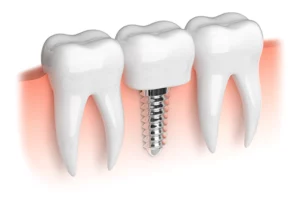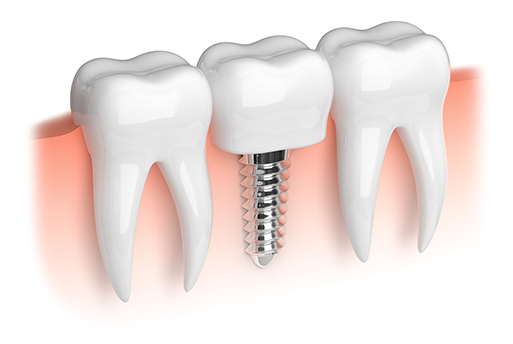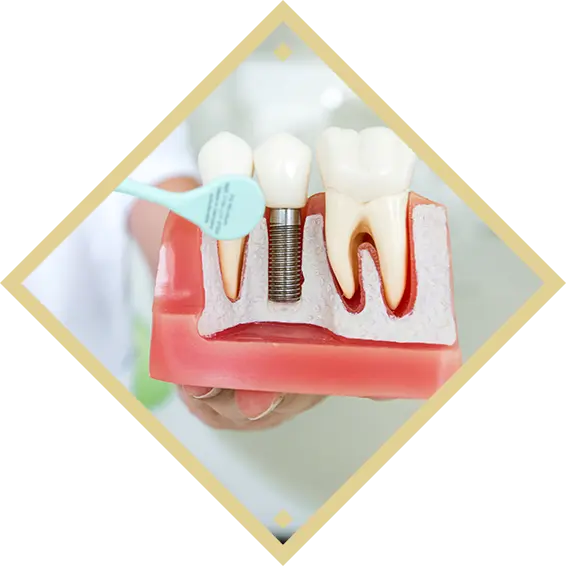The question of whether dental implants cause bone loss is a common concern among those considering this tooth replacement option. It’s crucial to address this query upfront to dispel any misconceptions and provide accurate information.

Dental implants do not inherently cause bone loss. In fact, they can actually help prevent bone loss in the jaw. Unlike traditional tooth replacement options such as bridges or dentures, which only replace the visible portion of the tooth, implants mimic the structure of natural teeth, including the root. This mimicking of natural tooth structure plays a vital role in preserving jawbone health and preventing bone loss.
How do Dental Implants Prevent Bone Loss?
Despite the potential risk factors, dental implants offer several mechanisms to prevent bone loss and maintain jawbone health:
Osseointegration:
- When a dental implant is placed in the jawbone, a process called osseointegration occurs. During osseointegration, the bone fuses with the implant, creating a stable foundation similar to a natural tooth root. This integration helps stimulate the surrounding bone, preventing bone loss over time.
Load-bearing Function:
- Dental implants function similarly to natural teeth, distributing chewing forces evenly across the jawbone. This load-bearing function stimulates the bone, encouraging its maintenance and preventing resorption.
Preservation of Jaw Structure:
- By replacing the missing tooth root, dental implants help preserve the natural structure of the jawbone. This prevents the bone from deteriorating over time, maintaining facial aesthetics, and preventing potential complications associated with bone loss, such as changes in facial appearance or difficulty chewing.
Stimulating Bone Growth:
- Dental implants exert pressure on the jawbone during chewing and biting, stimulating bone growth and density. This continuous stimulation helps keep the bone healthy and strong, reducing the risk of bone loss around the implant site.
What can be done if Bone Loss has occurred?
If bone loss has already occurred around a dental implant, several treatment options are available to address the issue:
Bone Grafting:
Bone grafting procedures involve transplanting bone tissue from another part of the body or using synthetic materials to augment the deficient bone around the implant. This helps restore bone volume and support for the implant.
Implant Revision:
In some cases, the implant may need to be removed and replaced with a longer or wider implant to provide better stability and support in areas of bone loss.
Peri-implantitis Treatment
If infection or inflammation is contributing to bone loss, treatment for peri-implantitis may be necessary. This typically involves thorough cleaning of the implant surface and surrounding tissues, along with antimicrobial therapy to eliminate infection.
Reasons For Bone Loss Around Dental Implants:
Despite the benefits of dental implants in preventing bone loss, certain factors can contribute to bone loss around the implant site:
Implant Placement Issues:
- Improper placement of the implant or inadequate stability can lead to stress on the surrounding bone, resulting in bone loss over time. It’s essential for dental professionals to ensure precise placement to minimize the risk of complications.
Infection or Inflammation:
- Infections or inflammation in the tissues surrounding the implant, such as peri-implantitis, can accelerate bone loss. Poor oral hygiene practices or neglecting regular dental check-ups can increase the likelihood of these complications.
Gum Disease:
- Pre-existing gum disease or insufficient gum tissue around the implant can contribute to bone loss. Gum disease compromises the supportive structures of the teeth, including the bone, leading to gradual deterioration.
Implant Overloading:
- Excessive pressure on the implant, such as from teeth grinding or clenching, can cause bone loss around the implant site. This phenomenon, known as implant overloading, can weaken the bone and compromise the stability of the implant.
Is it a Cause of Concern for a Diabetic Patient?
For individuals with diabetes, maintaining optimal oral health is particularly important due to the potential impact of diabetes on gum health and healing. While diabetes itself does not directly cause bone loss around dental implants, poorly controlled diabetes can increase the risk of complications such as infection and delayed healing, which may exacerbate bone loss. Therefore, individuals with diabetes should work closely with their healthcare providers to manage their condition effectively and minimize the risk of complications associated with dental implants.
Schedule Your Consultation with Dr. Joseph Today!
Ready to regain your smile’s confidence?
With personalized care and expertise, Dr. Joseph can help you explore dental implant options and address any concerns about bone loss. Don’t let uncertainties hold you back from achieving the smile you deserve.










